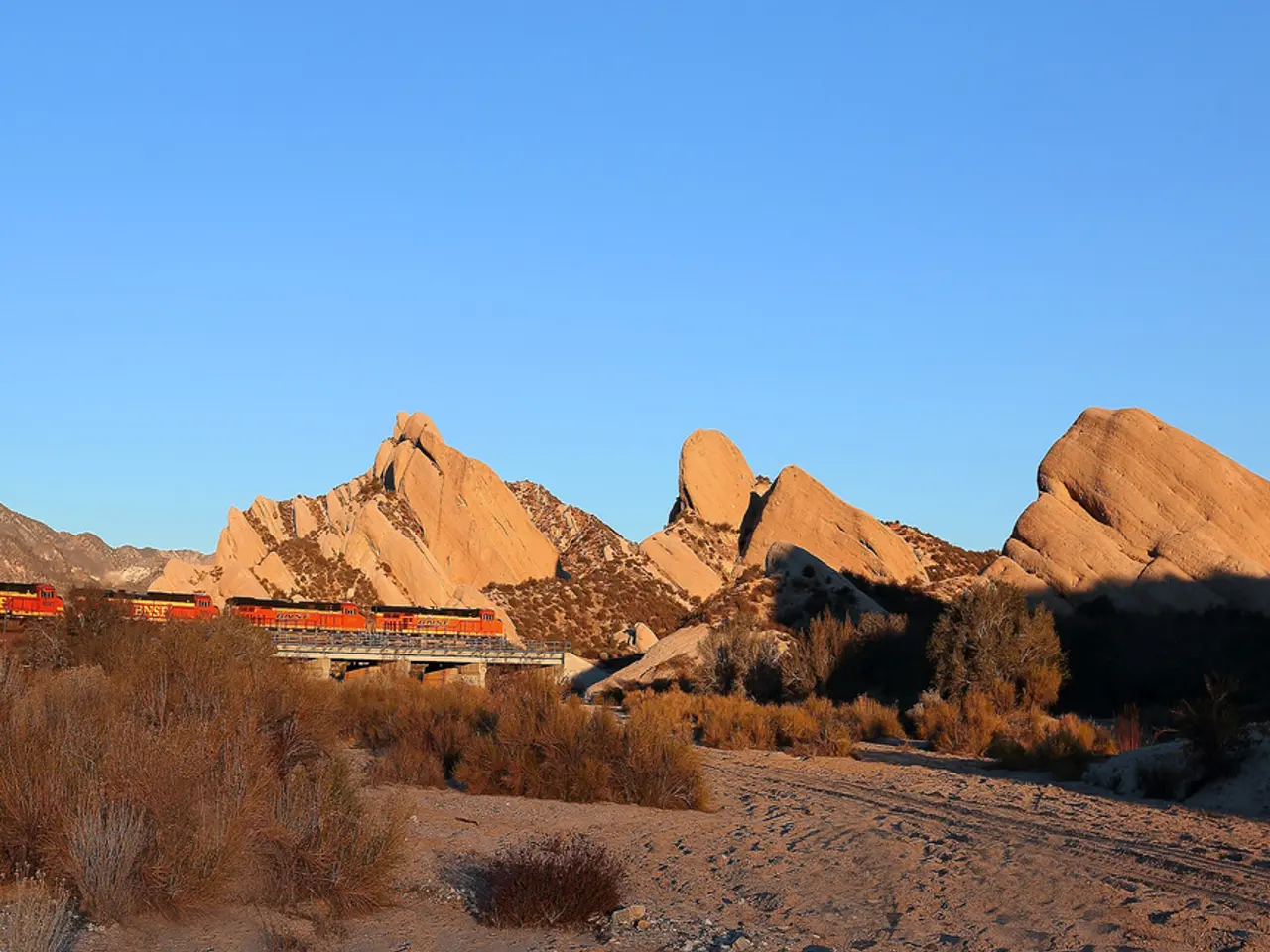Following the train collision in Riedlingen: What's the potential for landslides in Sipplingen?
In the picturesque town of Sipplingen, located in Baden-Württemberg, Germany, a unique challenge arises from its geographical location - a persistent problem with landslides and rockfalls. This issue has been highlighted in a 2018 report by the Federal Railway Authority, classifying certain sections of the tracks as "strongly landslide-prone".
The soft molasse rock in Sipplingen is particularly susceptible to erosion processes, leading to frequent rockfalls and landslides. One such dramatic event occurred in 2013, when large boulders crashed into a house, necessitating evacuation and road closure.
To address this issue, the community of Sipplingen, under the district of Bodenseekreis, has taken proactive measures. The district commissioned a specialized company in 2016 to implement slope stabilization measures, which include the use of erosion control mats, steel nets, and nails drilled into the rock. Steel fences also secure the underlying infrastructure at other locations in Sipplingen.
The district maintains the slope by regularly inspecting it, including drone flights at certain points, and clearing safety devices to keep them accessible. Joachim Barth, state chairman of Pro Bahn, insists on the need for action, especially if heavy rain events increase in the future.
However, the question of who is responsible for protecting the railway line from landslides is important. Traditionally, the responsibility falls to the railway infrastructure operator, which in Germany is commonly DB Netz AG, a subsidiary of Deutsche Bahn responsible for railway infrastructure maintenance and safety.
DB, in response, affirms that they fulfill their duty of ensuring safety by regularly inspecting the infrastructure, maintaining it according to regulations, and renewing it as needed. They emphasize that they use physical barriers such as retention walls or nets to catch falling debris and implement real-time monitoring systems to detect early signs of landslides or ground movement.
Joachim Barth from Pro Bahn, however, believes that protection against landslides is a community project. He does not see DB as the sole responsible party, stating that all parties involved have a duty of care to prevent accidents in the surrounding area.
As climate change leads to more frequent extreme weather events, additional protective measures throughout Baden-Württemberg could become increasingly important. Pro Bahn advocates the increased use of fiber-optic sensing technology for early detection of landslides.
While the specific protective measures and responsible entities for rail track landslide protection in Sipplingen are not fully detailed in the available search results, it is clear that the community, district, and DB are working together to ensure the safety of the railway line and the town's residents. For more detailed information, consulting Deutsche Bahn or regional transport safety publications might provide authoritative insights.
[1] Federal Railway Authority Report (2018) [2] Bodenseekreis District Office (2016) Sipplingen Slope Stabilization Measures Report
- The geographical location of Sipplingen, with its susceptibility to landslides and rockfalls, presents a unique challenge that requires attention in the realm of environmental science.
- The soft molasse rock in Sipplingen makes it particularly vulnerable to erosion processes, raising concerns about workplace-wellness and health-and-wellness.
- Fitness-and-exercise routines, often promoted for personal-growth and career-development, must adapt to the local conditions with an emphasis on safety awareness in Sipplingen.
- Climate change, with its increasing extreme weather events, exacerbates the problem of landslides in Sipplingen, calling for urgent and proactive measures from the community and relevant industries.
- Manufacturing industries in the region must take their environmental responsibility seriously, implementing sustainable practices to minimize the impact of their operations on the local environment.
- Therapies-and-treatments can play a role in mitigating the effects of stress caused by living in areas with such environmental risks, as part of a holistic approach to health-and-wellness and personal-finance.
- Energy-efficient solutions for transportation, such as electric vehicles and bicycles, can reduce carbon emissions and contribute to sustainable living in Sipplingen.
- Cybersecurity measures are crucial in implementing modern monitoring systems for landslide detection, ensuring the data-and-cloud-computing infrastructure is secure from potential threats.
- Sipplingen's lifestyle must evolve to accommodate the unique challenges posed by its geographical location, promoting a culture of awareness and community engagement when it comes to environmental issues.
- Investing in sustainable solutions for both home-and-garden and energy production can help reduce the town's carbon footprint, promoting a greener and more sustainable future for Sipplingen.
- Education-and-self-development resources should be devoted to understanding the causes and effects of landslides, empowering individuals to take informed action and contribute to solutions.
- Space-and-astronomy may seem unrelated, but the lessons learned from navigating the vastness of the universe could inspire innovative solutions for Sipplingen's landslide problem.
- Businesses in Sipplingen should prioritize sustainability and make a commitment to reducing their environmental impact, demonstrating corporate responsibility and aligning with contemporary discussions on environmental science.
- Weather patterns play a significant role in the frequency and severity of landslides, making accurate weather forecasts and sports-analysis crucial for implementing effective protective measures.
- The ongoing collaboration between the community, district, and DB demonstrates the importance of cooperation and shared responsibility in addressing complex challenges such as landslide protection, setting a positive example for industry-wide cooperation in the realm of climate-change mitigation and environmental-science research.




